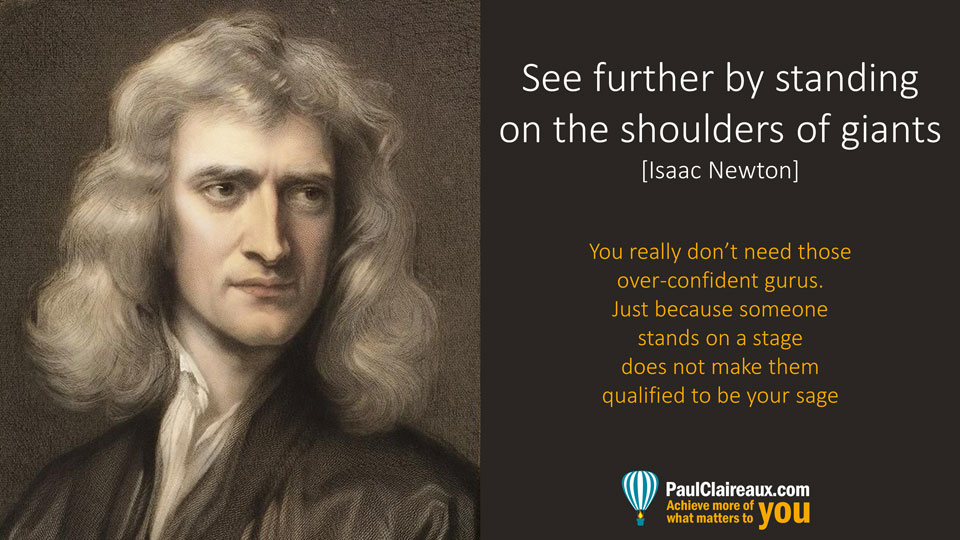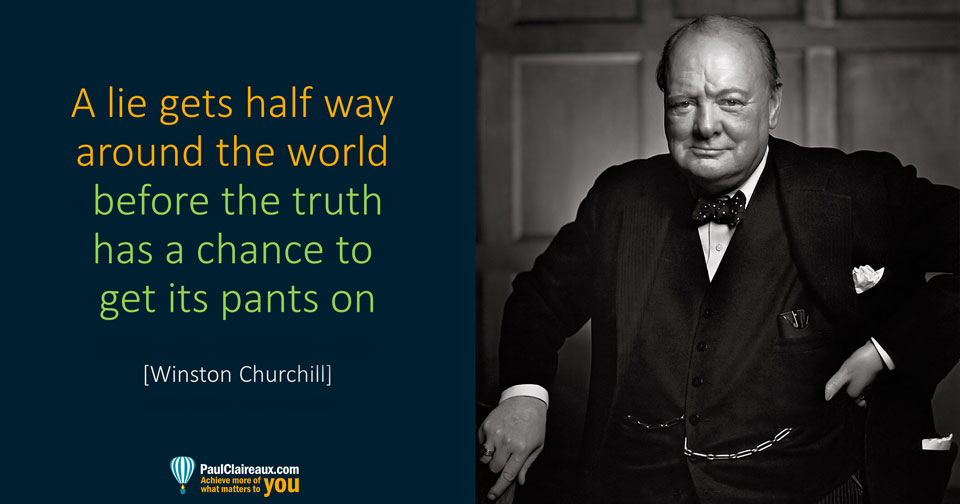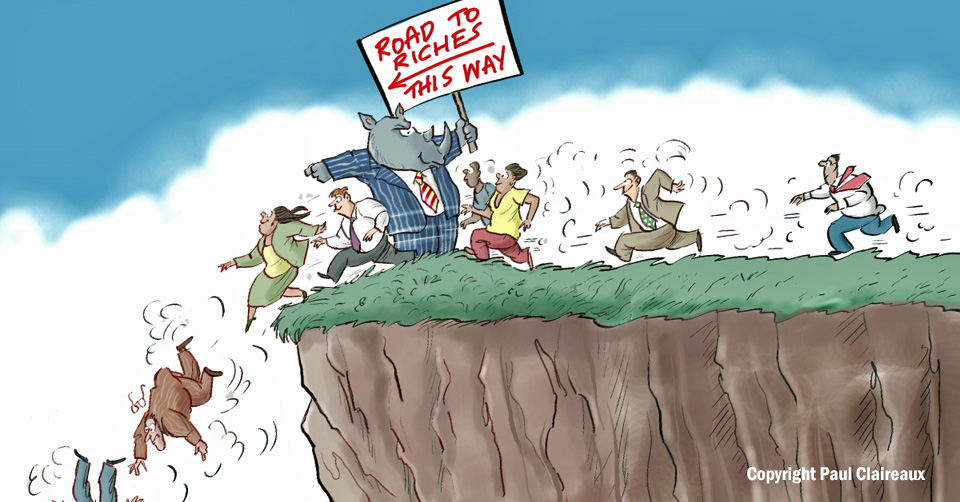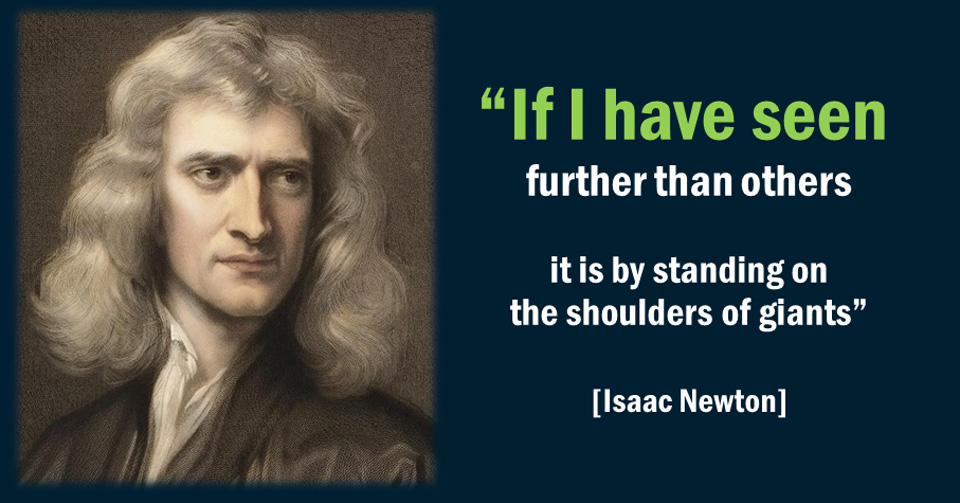Why you should ignore guru guidance
and climb on the shoulders of giants

If someone you care about is a raving fan of a ‘guru’ – and waits upon their guru’s every word – for life planning advice – please share this with them.
There really are better roads to self-improvement.
Inside the mind of a guru follower
Human behaviour can be funny sometimes… or at least I try to see it that way.
When people ask me what I do, and I tell them I write books, I often get a strange response, and if you’re going to write a book at some point, you need to be ready for this response too.
You might hope (at least in the first few weeks after publication) that having told someone you’ve written a book, they’ll ask you about it.
You might hope they’ll want to know exactly what the book is about; how long it took you to write it… and perhaps even ask you what inspired you to write it, and who else you’d recommend for help in this area?
You might hope that they’ll ask who the book is aimed at, and most importantly if your book is ‘non-fiction’, what they could learn from reading it.
Yes, that’s what you’d probably hope for. But talking to other authors, that’s not, generally, what happens.
Instead, as in many conversations, when you tell someone you’ve written a book, a lot of people just want to change the subject… onto something they’re more familiar with.
Sure, some will ask you about your book but many will be keen to tell you about another book that they have read.
If you’re lucky, this other book will be on a broadly similar subject to the one you’ve written, but often it will have nothing in common with your book… other than the fact that it’s a book, of course!
All you can be sure of is that this other book will have been written by their favourite ‘guru’.
‘Oh yes,’ they’ll say
‘You should read this other book. It’s really brilliant’
The question is… what would (or will) you do when that happens?
I can assure you it does happen a lot. And no, this is not just about my books, although I accept that to some people books about money may seem scary 😉
The fact is that most people struggle to ask open questions or listen intently to what others have to say. Most find it easier to talk about what’s in their head rather than to find out what’s in yours!
So, other than offering to tell them what they didn’t ask to know (and that can work well sometimes) I think the best thing you can do is to smile and thank them for their fascinating insight into someone else’s book…
At least that way you’ll leave them happy to have informed you on your subject… and blissfully unaware they’ve insulted you!
Yes, it is funny but it’s not harmless
Of course, this (subject-changing) response might be harmless, and possibly even instructive if their ‘guru’s ‘ book was any good – which some are.
But many of the most popular books are just misleading (Pop Psychology or Pop Motivational) nonsense – as the award-winning writer, Oliver Burkeman discovered when he studied the whole personal development and happiness industry for two years before launching his own book:
‘The Antidote. Happiness for people who can’t stand positive thinking’
The ‘Antidote’ by the way is one of my all-time favourite books which I’ve listed with others below.
Here’s what Oliver Burkeman said, in one of his talks, about one of the most popular of these (non-evidence-based) self-help books, The ‘Secret Law of Attraction’.
We’ve learned that visualising the successful achievement of your goals can have the reverse outcome
And that’s contrary to my least favourite self-help book – ‘The Secret’.
In case anybody here doesn’t know the thesis of ‘the secret’ by the way it’s that there’s a single confidential piece of wisdom that provides the answer to all human happiness and success – and has been passed down and kept secret through the generations.
It was, apparently, passed down from Aristotle to the Buddha to Jesus to Leonardo da Vinci and to Einstein and then…
well then to Ronda Burn who wrote the book the secret…
and ruined it, really!
That’s funny, right?
What’s also funny (peculiar, not ‘haha’) is how some of these gurus get to write books on subjects they know nothing about.
Take Tony Robbins and his book, ‘Money – Master the Game’ for example.
Now I’ve met Tony Robbins and spent two hours talking to him on a train between London and Bristol. He seemed to be a well-meaning person, and there’s no question that he knows how to make a lot of money, by drawing people into his events.
But I’m not sure that’s a good reason to take his every word on every subject as Gospel, is it?
Walking on hot coals is a bad idea
For example, walking on hot coals is not a great idea unless the coals have been properly ‘fixed’ so as not to burn your feet.
Sometimes that little trick can go wrong – as the Guardian reported on these unlucky souls.
What’s worse, as illustrated in this ‘Dallas News’ article, is that some guru followers blame themselves when things don’t go the way that their ‘guru’ promised.
Bahareh Hosseini of Dallas burned her feet so badly she couldn’t walk afterwards.
But, she said that she was fine later that week. That her burns were her fault and had nothing to do with Robbins or his staff.
She said she looked down at the coals rather than keeping her eyes up as Robbins had instructed her!
I hope someone has now told Bahareh that looking ahead, instead of down at her feet, while walking on genuinely hot coals will not stop her feet from burning.
I’d hate to think that she tried it again after her injuries healed! And you must decide on the value of that ‘trademark’ game.
I think Robbins would be the first to admit that he’s not actually qualified in investment or financial planning matters. So, he’s not ideally equipped to write a book on investing in stocks and bonds.
While he interviewed some big investment gurus for his ‘money’ book, some experts have real concerns about the promotional messages in his book
This is a brand stretching game
Generally, book publishers and event organisers encourage their gurus to branch out into NEW areas. They know that a raving fan will buy (pretty much) anything if it’s got their guru’s name on it.
I mean, for goodness sake, if a raving fan will walk across hot coals for their guru, asking them to buy another book is really not a big ask, is it?
For other writers and speakers who are more careful with the truth, this guru worship is intensely frustrating.
You might get some attention from a few people, but unless you get to be famous, you’ll have to listen to a lot of people telling you to read books on your subject, written by gurus who know little or nothing about the subject!
That’s hard enough for an evidence-based writer but what really matters is the damage done to others.
Just think of all the unsuspecting punters being drawn into buying the wrong books by the huge tribes of guru fans.
It’s not a good picture – and it’s exactly why this happens.

Fake news – the big enemy in the world today.
Fake news only survives because people don’t call it out – and because fans of gurus (and other famous people) continually promote it.
The gurus, and their marketing teams call this ‘brand stretching’…
I call it taking advantage of vulnerable customers.
Now, you might think that great care is taken to gather and check the facts before any book is published. After all, misleading statements could damage a guru’s brand, right?
Sadly, that’s not the case. Getting all the facts covered, in a balanced way, is not considered important to many guru publishers.
Why?
Because their customers (the raving fans) simply don’t fact-check their guru’s ideas. A proper, raving fan, believes (unquestioningly) in their guru. They have absolute trust in their guru’s advice – whatever it is.

This tendency to blind faith in successful/confident people is just one of many irrational human behaviours that constantly trip us up.
So, have I got all the answers for you?
Sorry, no – but what’s more, nobody has.
That said, I can point you to some solid, evidence-based ideas… and I won’t make false claims about inventing them.
So, I guess that means I can’t claim to be a guru!
Ah well, that’s okay, I’m happy to research and write about ideas that fascinate me, especially if they can truly benefit all of us.
You see, I believe firmly in Sir Isaac Newton’s idea that, if we occasionally have an ‘insight’ it’s probably because we’ve stood on the shoulders of giants’

So, what are these ideas that fascinate me?
Well, these ideas cover four broad areas.
- The real factors that drive human happiness, motivation and performance
- Behavioural booby traps (aka the irrational side of human behaviour)
- The (often less obvious) rational side of human behaviour.
- How we (and many experts) misunderstand investment risk (which is what caused the financial crisis BTW)
If these subjects fascinate you, try these books by truly giant thinkers – in those four areas.
On what drives human happiness and performance
- ‘Chimp Paradox’ by Dr. Steve Peters, Psychiatrist and Coach to the multi-gold-medal-winning British Olympic cycling team
- ‘Tiny Habits’ by BJ Fogg, PhD.
- ‘Mindset’ by Dr Carol Dweck.
- ‘The Emotional Life of your brain’ by Richard Davidson PhD
- ‘Feeling Good’ by another psychiatrist, Dr David Burns
- Emotional agility’ by Susan David, PhD.
- ‘Engineering Happiness’ by Manel Baucells & Rakesh Sarin.
- Anything by Kenneth Blanchard and his team on Leadership and Management.
- ‘Changing for Good’ by Prochaska, Norcross, DiClemente.
- ‘Strengths Finder’ by Tom Rath.
Be sure to read Oliver Burkeman’s awesome book, ‘The Antidote’ too – as there’s really no better book for exposing the charlatans in the happy-clappy positive psychology movement for what they are.
Burkeman is a brilliant (and funny) writer.
What you don’t need are books by self-proclaimed gurus, especially those who sell crazy expensive (happy-clappy) seminars to vulnerable people.
On the irrational side of human behaviour
You could start by reading:
- Daniel Kahneman’s ‘Thinking fast and slow’ – this one’s a big book.
- Dan Ariely’s ‘Predictably Irrational’ (which will be more accessible for some) and
- ‘Everything is obvious once you know the answer’ – a brilliant and entertaining book by Duncan Watts.
Then, on why we might be more rational than we think
I’d recommend these four books:
- Tim Harford’s ‘Undercover Economist’ and ‘The Logic of life’ and
- Steven Levitt & Dubner’s ‘Freakonomics’ and ‘Superfreakonomics’
Finally, if you want to learn about the flaws in economics…
I’d recommend these books for starters
- George Cooper’s ‘Fixing Economics’ and ‘The origin of financial crises’
- Two books from Physicist Mark Buchanan: ‘Ubiquity’ and ‘Forecast’
- Oxford Mathematics Doctor David Orrell’s ‘Economyths’.
- ‘Irrational exuberance’ by Nobel Prize winner, Professor Robert Shiller
- The ‘Misbehaviour of markets’ by the father of Fractal geometry Benoit Mandelbrot
- Raghuram Rajan’s ‘Fault lines’.
- Nassim Taleb’s books ‘Black Swan’ and ‘Anti Fragile’.
- Roger Bootle’s ‘Trouble with markets’.
Why might you want to read those books?
Well, it was the broken economic models that led us into the last financial crisis… and some wealth managers still use those broken models to advise their clients on Investment risk today. So, you might want to get ahead of them.
Sounds like a lot of reading!
That’s true, this is a lot of books to read, and I’m just scratching the surface of the list I could recommend.
And if you want to save time, you might want to start with one book that will give you some key insights from all of those books above and more.
For that I’d recommend you start with my first book, ‘Who can you trust about money?’
Yes, that was a shameless plug but the fact is, this book will give you a head start on at least two years of reading, and I still recommend all of those books above 🙂
So, what is ‘Who can you trust about money?’ about?
Well, the clue is in the name… but it’s a two-part book.
In part one, I explore what you might expect – all the big external enemies to our money. So, that includes the Economists with their broken models and the Politicians who over-promise right down to bad or overcharging financial salespeople and scammers.
In part 2, we dive into the ‘enemies within’ our own heads. So, this is the behavioural science that everyone’s talking about these days.
‘Who can you trust about money? is a few years old now, but that doesn’t matter. Like a lot of the books I recommend, most of the ideas I write about are ‘evergreen’; they don’t go out of date just because we have a change of President or Prime Minister or Interest rates or in the direction of Stock Market or Property prices.
These are ideas to help you throughout your life.
So, here’s the bottom line
If you want to see further than others,
follow Isaac Newton’s advice.
and stand on the shoulders of giants.
You don’t need those big name gurus.
They’re often just confident sales people and performers.
Just because someone is standing on a stage
does not mean they’re qualified to be your sage.
Thanks for dropping in
Paul
For more ideas to achieve more in your life and make more of your money, sign up to my newsletter
As a thank you, I’ll send you my ‘5 Steps for planning your Financial Freedom’ and the first chapter of my book, ‘Who misleads you about money?’

Also, for more frequent ideas – and more interaction – you can join my Facebook group here
Share your comments here
You can comment as a guest (just tick that box) or log in with your social media or DISQUS account.

Discuss this article